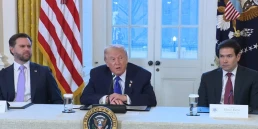Even with U.S. health premiums set to double, senators gave essential health funds as a bonus to the $1 trillion Pentagon.
By Lindsay Koshgarian, OtherWords
The government shutdown ended with a failure to solve the problem of steeply rising health insurance premiums.
The GOP’s “Big Beautiful Bill,” which slashed programs like Medicaid and SNAP to fund tax cuts for the wealthy and a $1 trillion Pentagon, allows tax credits that reduce these health costs for ordinary people to expire at the end of this year.

As a result, millions of Americans who receive health insurance through the Affordable Care Act marketplace will see their health insurance premiums double (or worse). Democrats demanded a fix for the problem, but ultimately ended the shutdown without one.
But even in the midst of the shutdown, Senators were still busy. They approved a $32 billion increase for the Pentagon on a bipartisan basis, approving the increase by a vote of 77-20 as part of a larger bill, the National Defense Authorization Act.
Yet the same Senators couldn’t agree to extend those health care subsidies by even a single year to save millions of people from devastating premium increases. The price tag for a single year of extending the subsidies would be about $35 billion, according to the Congressional Budget Office — about the same as the Pentagon increase they just overwhelmingly approved.
Now millions of Americans are facing decisions about how — or even whether — to maintain their health insurance given the huge price increases they face. These expiring credits, along with the GOP’s Medicaid cuts and other changes, are expected to cause 17 million Americans to lose their coverage in the coming years.
Senators agreed to a vote on a possible solution for the expiring ACA credits, but there’s no such agreement in the House of Representatives, making any solution highly unlikely.
The Senate’s $32 billion increase comes on top of the previously passed $156 billion increase from the president’s Big Bad Bill. That already promised to push military spending over the $1 trillion mark — by a significant margin, the most we’ve ever spent on the Pentagon during peacetime.
The Senate’s additional $32 billion adds insult to injury. Much of that sum would go to shipbuilding and buying more F-35s, fighter jets which are considered outrageously expensive and often criticized as ineffective.
Along the way, the Senate also defeated amendments that would require military and law enforcement to display clear identification when conducting crowd control — and another that would have required congressional approval for domestic military deployments for law enforcement purposes after 30 days. (Trump’s National Guard deployments to American cities, by the way, have now cost taxpayers nearly $500 million.)
Apparently, even the lowest bars for accountability for Trump’s Pentagon were too high for lawmakers.
But it’s not over — the House and Senate still need to reconcile their Pentagon funding levels. While that will likely happen behind closed doors, members of Congress will still be receptive to calls from their constituents. It’s not too late to defeat that $32 billion.
And then we can get to work using that money to save health care subsidies and keep millions of Americans from losing health insurance.
Recent Posts
‘Uninvestable’: Oil Execs Rebuff Trump’s Demands For $100bn Investment In Venezuela
January 12, 2026
Take Action Now The US Energy Secretary denies ‘stealing’ Venezuelan oil, despite a plan to hold revenues in offshore accounts under US…
Want To Stop ICE? Go After Its Corporate Collaborators
January 12, 2026
Take Action Now ICE can’t function without help from the private sector. So we should force the private sector to stop helping.By Eric Blanc,…
Organized Labor Lambastes Trump’s Attack on Venezuela
January 11, 2026
Take Action Now Unions and international labor federations argue that it’s the same billionaires that want to run Venezuela who keep us working…
Schumer, Jeffries Refuse to Join Democrats’ Growing Calls to Slash ICE Spending
January 10, 2026
Take Action Now “I just don’t understand how we provide votes for a bill that funds the extent of the depravity,” said Sen. Chris Murphy.By Julia…




